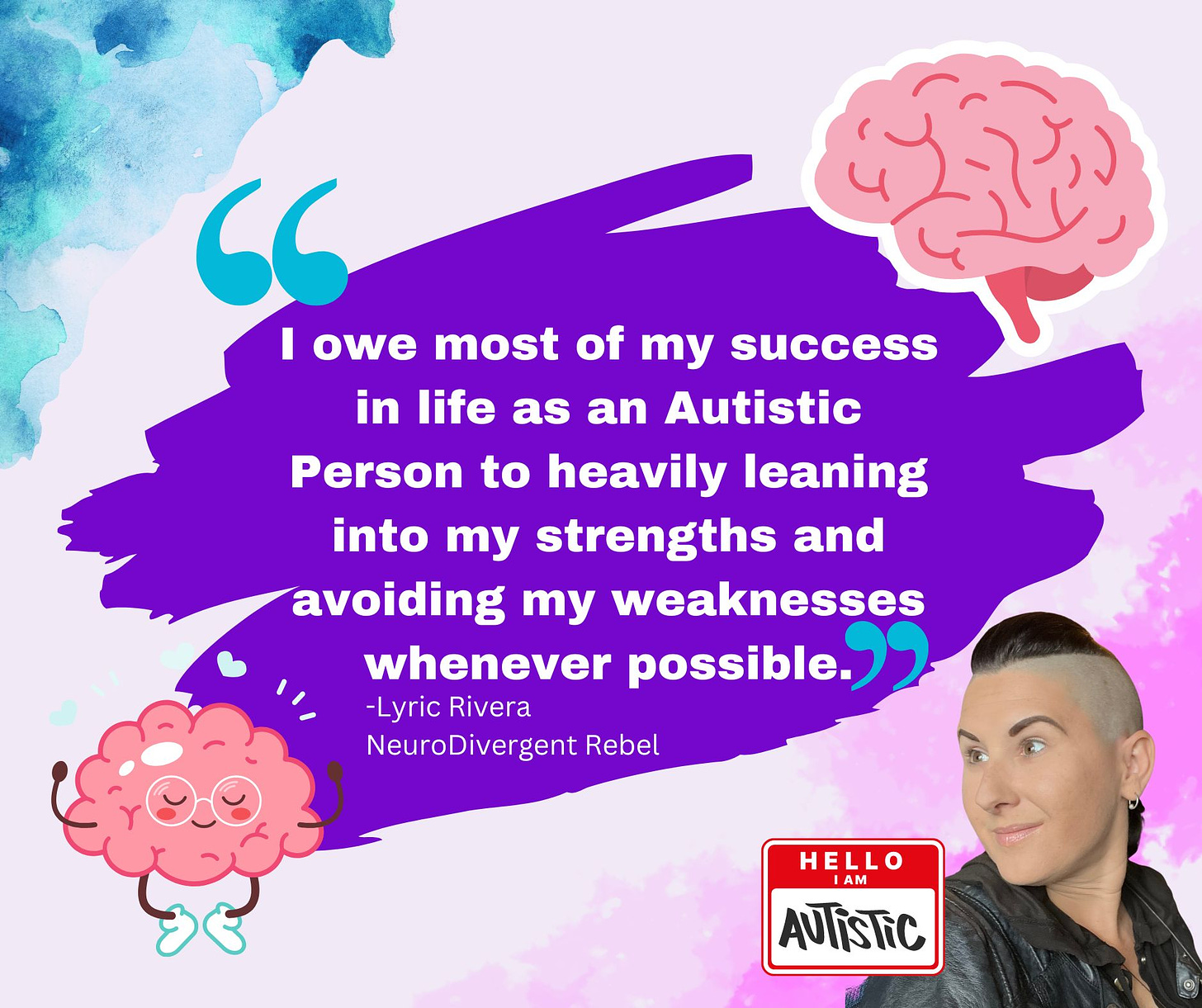Autism and Spiky Skills: Leaning into My Autistic Strengths (and Avoiding My Weaknesses)
I owe most of my success in life as an Autistic Person to heavily leaning into my strengths and avoiding my weaknesses whenever possible.

I owe most of my success in life as an Autistic Person to heavily leaning into my strengths and avoiding my weaknesses (or enlisting the help of people who are good at things I struggle with to compensate).
This is why I went undiagnosed/undetected as Autistic for the first twenty-nine years of my life – because I was so good at “leaning in.” It would take being forced to face my weaknesses, with no support or compassion for them, to expose me as Autistic to myself (and the world).
In the world we live in today, though the language is quickly changing and evolving, all too often Autistic People are only defined and described by our deficits, meaning Autistics who have done well to lean into what they excel at can easily be missed since they’re not seen as struggling (though they may be struggling in invisible ways).
Growing up, nobody knew I was Autistic, and my Autistic traits were mostly ignored (unless they inconvenienced, confused, or amused other people).
I, and many Autistic People, have a “spiky skills and abilities profile” – meaning we often have strengths and weaknesses our non-autistic counterparts don’t.
As a kid, reading was one of my spiky skills. I taught myself to read at the age of one and a half.
In the first grade, my reading level was so high it was beyond what they could score on their tests. Though my reading level was advanced, I struggled in other areas my peers didn’t struggle with.
Out of all the kids in my first-grade class, I was the only one who could not stay in my seat. I could read exceptionally well to myself, but I could not read even the grade-level materials out loud in front of my peers.
Most of the other kids could get through the day without having their “behavior tag” changed, keeping their “green” status and earning a prize at the end of the day.
My “behavior tag” was switched daily from green to yellow and then down to red. Instead of a prize, I got a note home to my guardians, informing them of my “bad behavior.”
In school, I could not “lean” into my strengths or avoid my weaknesses because I was expected to be “average” (well-rounded) – despite my brain falling outside of the NeuroTypical norm.
My Autistic brain is specialized.
I don’t control or choose my topics of specialization and interest. They chose me. My brain hyperfocuses on topics that catch its attention (sometimes obscure ones) and then latches onto them with the intensity of a starving animal that won’t be deterred from a meal.
When what my brain has latched on contributes positively to my life, falling into this new interest is like falling in love with similar passion and intensity.
The new thing is all I can think about as I am flooded with the desire to know everything there is to know about the new love that has entered my life.
In this way, if the hyperfocused area grows into a strength I can lean into, my tendency to ruminate and struggles to let go of things can be a strength.
There is duality in this ability because, as I mentioned earlier, I struggle greatly to steer where my focus goes or what interests (or worries) it will latch onto. If my fixations are on problems that cannot be solved or are unhelpful in other ways, they can take over my life and energy, derailing what I would rather be doing. This is one of my most significant weaknesses (that I cannot avoid).
I avoid most of my weaknesses whenever possible. As a kid, this was hard, with adults constantly pushing me to “overcome” my weaknesses (Autistic traits they didn’t understand). As an adult, I have more autonomy.
Children are some of the most oppressed humans in our world, but people are uncomfortable talking about how their parents are often their biggest oppressors.
As an adult, my Autistic traits “interfere with other people” much less than when I was a kid because I remove people who interfere with my Autistic traits from my life.
Many of the problems I faced as an Autistic kid were related to my high need for autonomy and the issues created when dealing with authority figures who expected me (a child) to comply with adults without question (even though I had a LOT of questions).
Keep reading with a 7-day free trial
Subscribe to NeuroDivergent Rebel’s Substack to keep reading this post and get 7 days of free access to the full post archives.



